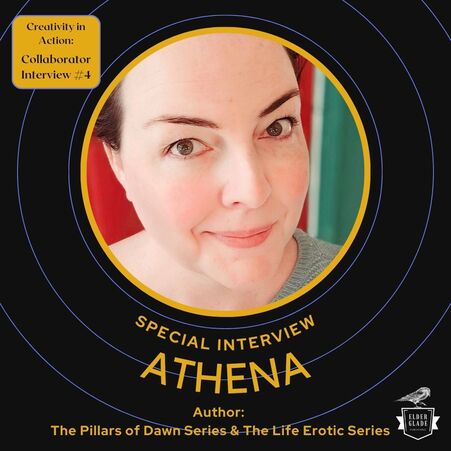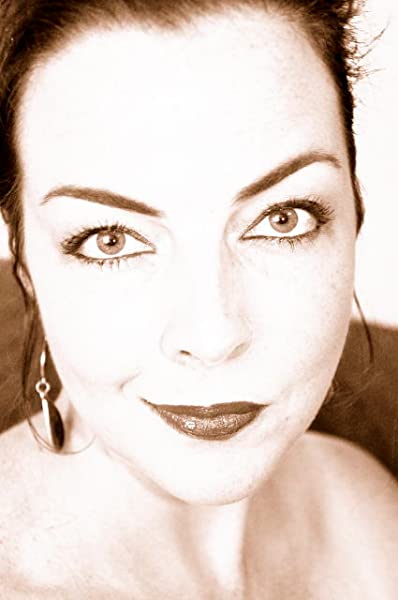|
4/9/2024 0 Comments An Interview with Athena
If by Muses, you mean other artists, then there are way too many to name here! EGP: How do you prevent writer’s block or burnout? A: I don’t believe in writer’s block. Either it’s a Bergabesh monster that’s been contrived to create an excuse for writers, or I’ve just never encountered it. When I feel “stuck” it’s usually because the story hasn’t finished cooking in my brainpan, like a dough that’s still rising OR there’s a case of psychological avoidance going on that I need to look at. Usually, I can get through a tar patch by doing something completely unrelated to writing that occupies my hands and creativity; cooking, sculpting, photography—then when I go to sit down and write again the answer is usually there. Doing Creativity in the Round or managing my creative flow through different stations and activities around my home or through my schedule helps prevent burnout. I’d like to say I don’t get burnout, but that would be a lie—I run myself right to the dirt regularly when I get caught up in the joy of the build and forget to stop and breathe. Doing the Creativity in the Round method slows me down. It forces me to get up and move, change creative focus every so often, and switch the sides of my brain so I don’t hit a wall too quickly. EGP: Did you choose to self-publish from the start, or did you seek traditional publishing first? A: Originally, I took the traditional route for publishing. My first contract was with Schiffer Publishing in 2007. When it came time to publish Murder of Crows in 2011, I sent out 120 queries before going the self-publishing path. If I’d known then what I know now—I would have just gone straight to self-publishing. If someone needs the external validation of having been “chosen” or the support of being taken care of through the process—then self-publishing is not for them. However, if you want the creative freedom, control over the speed and outcome and direct access to your readers in a much more intimate forum, then the indie life of self-publishing is a dream come true. EGP: On what platforms do you publish and why? A: I’m currently using KDP and Ingram. I went with Ingram because I love having access to the expanded global distribution for print and the catalog access to large bookstores and small shops as well. While KDP has the digital distribution reach and all the Amazon platforms in multiple countries, there are issues with the print viability on that same matrix—and you can’t be ordered in bookstores if you’re only with Amazon. The Elder Glade Publishing sponsored platform for integrated media distribution should be going live next year, at which time I’ll add the rebooted Pillars of Dawn and Life Erotic series to the new platform, along with our roster of new creators. EGP: What is your process for editing before you publish as an author versus what you are building at EGP? A: Oh, good question. My process for feedback and editing as an author is much more personal and specific to my vision as a creative inside the Mandalic Storyverses I render. So, finding editors, and collaborators who can play or work within those world builds is critical. Those editors must be fluent in story; not just language, not just grammar, spelling, syntax. They need to be well-rounded people with a mind that can take in several layers of context and several interconnected constructs moving interdependently. Editors for EGP will work on several types of projects, so they need to be able to jump back and forth from Mandalic Storyverse to linear three-act structure and so on. All editors whether just for my books, or the works of other artists under the label, or just for marketing and presentation need to be comfortable knowing the difference between the target intention and their own personal preferences and projections. Editors have skillsets and comfort zones just like any creator, so part of EGP planning is matching the right editor with the right story—and not just that but the right part of the right story. From developmental, worldbuilding to copy and line then proof, a book might get five different editors based on their best qualifications and contributions to a work and what the writing needs in order to shine for an audience. EGP: What is your process for feedback? A: It depends on my level of familiarity and trust with the person providing the feedback. I know what I like and what I want—that doesn’t always mean my writing conveys those intentions. Finding someone who’s good at bridging a gap between my intent and the execution--based on the writing and understanding of the worldbuilding materials--to sharpen my intention so I hit my target more accurately and with more impact is the goal. With that in mind, I do a lot of testing with collaborators to see what sticks and who can lunge into a gap and provide that accuracy. A sample of work will tell me if an editor or collaborator is a good “sentence editor” but a larger project will tell me if they are a good “story editor.” The collaborators that I LOVE and hold onto and come back to again and again to build amazing things with, follow these principles.
EGP: What’s the fastest way to get through a pile of feedback notes? A: Just keep asking, “Is this better? Or different?” “Better? Or Different?” EGP: How do you market your books as an author versus a publisher? A: As an author I tended… not to do marketing. As an individual with IPs that I knew would take several years to write, I had nightmares of receiving buckets of hate mail if I couldn’t keep up with readers’ needs. I had actual panic attacks about it. I knew I wouldn’t be able to produce fast enough on my personal budget. So—I kinda tried to stay hidden until I was at least halfway down the pipeline. As a publisher—ALL THAT HAS TO CHANGE. Now we’re out there, and the platform needs to grow. Now is when we’re having the real marketing discussions for how we’d like the label and the artists to be seen, referenced and supported by a visible, yet humane marketing plan. We’ve had many marketing plan discussions with large firms and I’m still not finding those strategies that will be supportive to authors and their works without putting them in uncomfortable public positions that impact creativity and a sense of safety. People on the internet can be awfully cruel, so building a marketing strategy that keeps creatives protected while also allowing them a safe and enlivening portal to the audience is still in development. While social media is a huge part of a marketing plan, it shouldn’t be the only plan. As we talk with firms and develop strategies, we’ll be looking for hybrid solutions to social media and a more local grass roots approach to platform building and marketing. EGP: What is the most important part about writing and publishing stories to you? A: The audience. Always. EGP: What are the most valuable lessons you’ve learned as a writer? A: Don’t edit as you write. Either you’re writing, or you’re editing. Period. Don’t try to do them both at the same time or you’ll slide around your manuscript and get frustrated. (I never drink when I’m writing. However, I do drink, usually a glass of wine, when I’m editing. It slows my thoughts down enough to catch little things and informs my brain, “Hey! We’re looking right now, not building, okay?”) Better yet—just write. Let a real editor do the editing. Save your energetic resources and keep building. EGP: It can be discouraging when a writer publishes a novel that doesn't have commercial success. What advice do you have for writers who get discouraged? A: Everyone believes they’re writing the next best seller, and they probably are! I wish for all writers to know the joy of feeling successful according to their own personal dreams. In the meantime, we all put out a few non-commercial successes. Does that mean they’re duds? Unworthy? We have only our expectations of what success is, and many of us writers don’t even agree on that because it’s so individual per person. Validation comes in many forms, and for many reasons we are often not measuring or even looking for. This means that a book can be a literary success and highly acclaimed, while not bringing in a margin that covers costs. It can also happen the other way around. When authors get discouraged, I empathize. I know how awful it feels to not believe I’ve been successful. Then I bump into a reader or get a piece of fan mail and my perspective just pivots to gratitude that someone somewhere read my little book. It’s hard to cash an imaginary gratitude check to pay the rent. I get it. But the trick I’ve learned is that the sooner I can stop NEEDING the work to pay me, the sooner the work actually pays me. The sooner I can get on board and cheer other people’s successes, and rally behind their achievements… the sooner those miracles happen in my own court. The faster I get to gratitude, joy, and put my hands on the keyboard, then the sooner those things I love will double, and repay all the efforts without me having to feel the emptiness of an unmet expectation.
A: Don’t overthink it. You’ve got a great story. You’ve worked hard to put it into the best form you can. It might not be perfect. We’re not looking for perfect anyway. Hit the submit button and go enjoy your day. In the event we can’t pick you up for any number of reasons, just try again during the next window, or a different publisher, or a different plan. There is nothing on this planet worth a moment of worrying about a submission process. You’ve done your best. Show us what you’ve got and get back to living a full and creative life. EGP: Thank you for your time!
0 Comments
Leave a Reply. |
Archives
June 2024
CategoriesAll 5 Minute Creativity Adaptation News Collaborators Creativity Challenges Creativity In Action EGP Notes Entertainment News Interviews Launch News Prompts Storytelling Craft Storyverse The Life Erotic The Life Erotic Discovery Journals Twin Flame World Building Writing Craft |
Search by typing & pressing enter



 RSS Feed
RSS Feed